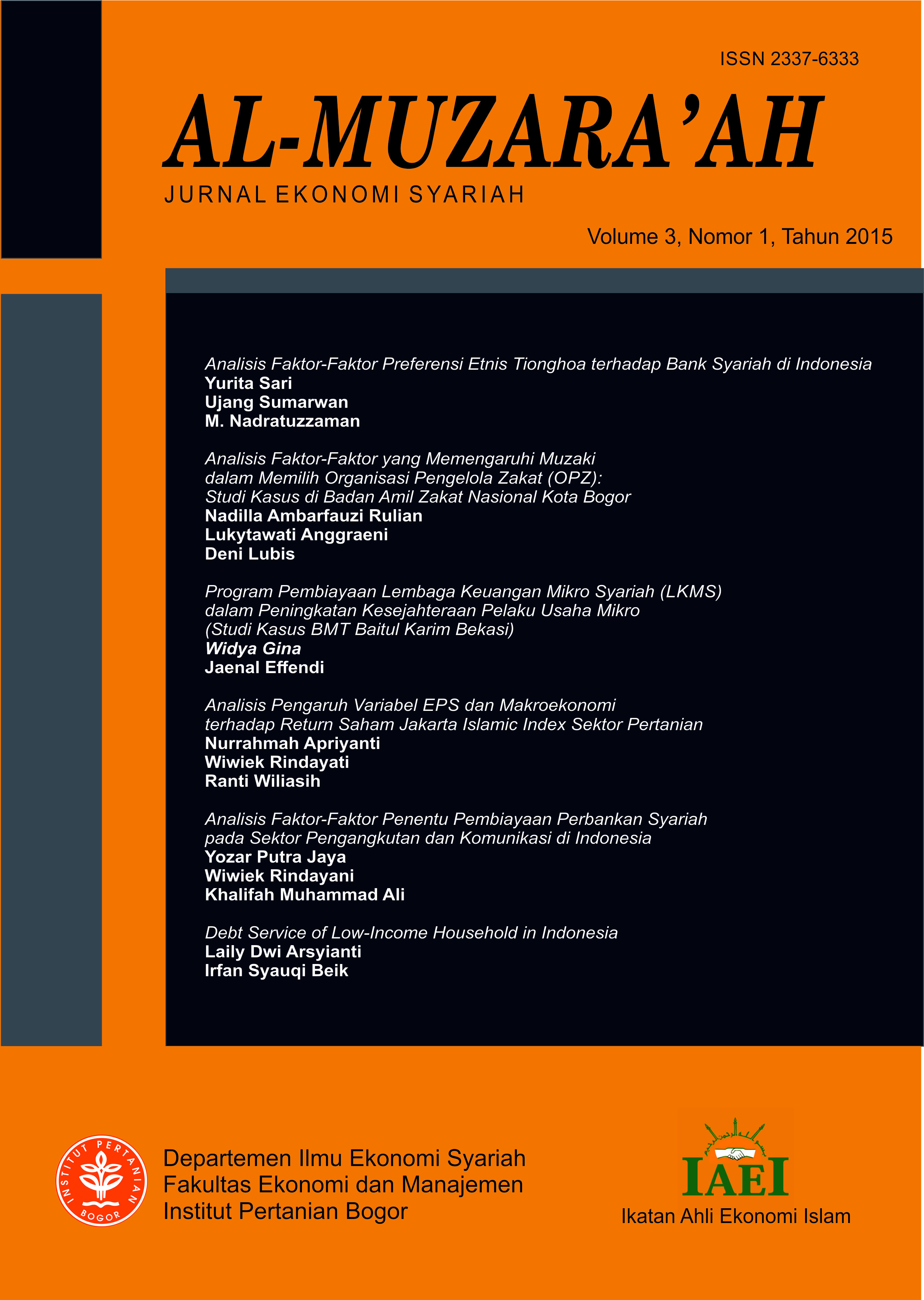Program Pembiayaan Lembaga Keuangan Mikro Syariah (LKMS) dalam Peningkatan Kesejahteraan Pelaku Usaha Mikro (Studi Kasus BMT Baitul Karim Bekasi)
Main Article Content
Abstract
The role of micro business enterprises in employment is quite large, namely 99.9% of the total workforce in Indonesia. This suggests that micro businesses have a great opportunity in economic development and increased prosperity. This is not in accordance with the improvement of social welfare of the poor because of the high of the poor up to 10.96% of the total population. The limited capital on micro businesses is an obstacle that is difficult to be avoided. In this case, the financing provided by the BMT is crucial for micro enterprises in accessing capital. The purpose of this study is to analyze the effect of the financing program in increasing income and welfare of micro businesses. The method used in this research is the method of Ordinary Least Square (OLS and logistics method. Significant variables that positively affect the revenue are captured financing of respondents, the number of family members whose income, education, and ethical and moral variables. The variables that positively and significantly affect the welfare are the length of time member, meal expenses, average income, and financing that are taken by respondents.
Downloads
Article Details

This work is licensed under a Creative Commons Attribution-ShareAlike 4.0 International License.
Author(s) who published in this journal agree to following terms:
- Authors understand and agree that copyright of manuscripts published are held by Al-Muzara'ah. The statement to release the copyright to Al-Muzara'ah is stated in form CTA (link doc).
- Copyright encompass exclusive rights to reproduce, to distribute, and to sell any part of the journal articles in all form and media.
This work is licensed under a Creative Commons Attribution-ShareAlike 4.0 International License (CC BY-SA) where Authors and Readers can copy and redistribute the material in any medium or format, as well as remix, transform, and build upon the material for any purpose, but they must give appropriate credit (cite to the article or content), provide a link to the license, and indicate if changes were made. If you remix, transform, or build upon the material, you must distribute your contributions under the same license as the original.
References
Ariyanto DAN. 2011. Peranan Al-Mudharabah sebagai Salah Satu Produk Perbankan Syariah dalam Upaya Mengentaskan Kemiskinan di Indonesia. Jurnal Ekonomi dan Pendidikan. Volume 8 Nomor 2, November 2011
[BKKBN]. 2013. Usia Produktif dan Ketenagakerjaan. [internet]. [diunduh 2015 Maret 20]. Tersedia pada: http://www.bkkbn.go.id
[BPS] Badan Pusat Statitik. 2014. Tingkat Pertumbuhan Penduduk Miskin Periode 2013 – 2014. [internet]. [diunduh 2015 Januari 10]. Tersedia pada http://www.bps.go.id
[BPS] Badan Pusat Statitik. 2012. Tabel Perkembangan UMKM Periode 1997-2012. [internet]. [diunduh 2015 Januari 4]. Tersedia pada http://www.bps.go.id
[DEPKOP] Kementerian Koperasi dan UKM. 2012. Perkembangan Data Usaha Mikro, Kecil, dan Menengah (UMKM), dan Usaha Besar (UB) Tahun 2011-2012. [internet]. [diunduh 2014 Desember 3]. Tersedia pada: http://www.depkop.go.id.
[DEPKOP] Kementerian Koperasi dan UKM. 2012. Kriteria usaha mikro, kecil, dan menengah menurut UU No. 20 Tahun 2008 Tentang UMKM. [internet]. [diunduh 2014 September 2014]. Tersedia pada: http://www.depkop.go.id
Dusuki AW. 2007. Banking for the Poor: The Role of Islamic Banking in Microfinance Initiatives. Proceedings of the 2nd Islamic Conference 2007 (iECONS2007)
Fahrudin A. 2012. Pengantar Kesejahteraan. Bandung: PT Rafika Aditama
Faisal. 2013. Aplikasi Pembiayaan Qardh dan Kaitannya dengan Kesejahteraan Sosial Dalam Sistem Ketatanegaraan Bagi Pencapaian Tujuan Perbankan Syariah. Jurnal Hukum Tata Negara. Vol.2 No.1 April 2013 hlm. 132-148
Firdaus M, Harmini, Farid. 2011. Aplikasi Metode Kuantitatif untuk Manajemen dan Bisnis. Bogor (ID): IPB Press
Hidayati N. 2014. Faktor-Faktor yang Memengaruhi Realisasi Pembiayaan Mikro Syariah dan Dampaknya terhadap Omzet Usaha Nasabah: Studi Kasus KJKS BMT UGT Sidogiri cabang Koja Jakarta [skripsi] . Bogor (ID): Institut Pertanian Bogor
Karim R, Shamsunnahar T, Manzur RF. 2012. Role of Micro-Credit in Poverty Alleviation of Rural Poor: Evidence fro Laxmipur District of Bangladesh. Volume-VII Number-02, July-December, 2012
Khadijah S, Saleh NEP, Kamarudin MF, Haryadi A. 2013. Sustainability of Islamic Micro Finance Institutions (IMFIs). Journal of Accounting and Finance. DOI. 10.13189/ujaf.2013.010205
Oktavi S. 2009. Analisis Faktor-Faktor yang Memengaruhi Pengambilan Pembiayaan dan Efektivitas Pembiayaan Usaha Kecil pada Lembaga Keuangan Mikro Syariah: Studi Kasus KJKS BMT Bina Umat Sejahtera. Bogor (ID). Institut Pertanian Bogor
Rahman MM. 2010. Islamic Micro-finance and Its Impact on Rural Poverty Alleviation. International Journal of Banking and Finance. Vol.7 Issue 1, article 7
Septiana RM. 2013. Analisis Dampak Pembiayaan Mikro Syariah terhadap Perkembangan Keuntungan UMKM di Kota Bogor [skripsi]. Bogor (ID): Insitut Pertanian Bogor
Soemitra A. 2009. Bank dan Lembaga Keungan Syariah. Jakarta: Kencana
Supriyanto. 2006. Pemberdayaan Usaha Mikro, Kecil, Menengah (UMKM) sebagai Salah Satu Upaya Pengentasan Kemiskinan. Jurnal Ekonomi dan Pendidikan. Volume 3 Nomor 1, April 2006
Tambunan T. 2009. UMKM di Indonesia. Bogor (ID): Ghalia Indonesia
[TNP2K] Tim Nasional Percepatan Penanggulangan Kemiskinan. 2012. Perkembangan Tingkat Kemiskinan Indonesia. [internet]. [diunduh 2014 September 9]. Tersedia pada: http://www.tnp2k.go.id
[TNP2K] Tim Nasional Percepatan Penanggulangan Kemiskinan. 2012. Program Kredit Usaha Rakyat (KUR). [internet]. [diunduh 2014 Januari 15]. Tersedia pada: http://www.tnp2k.go.id
Tsafe BM, Rahman RA. 2013. Effects of Spiritually on Board Performance in Malaysian Microfinance Firs. Middle-East Journalof Scientific Research 18 (5): 675-688, 2013
Tunas ANP. 2014. Analisis Pengaruh Pembiayaan Syariah terhadap Perkembangan Usaha Mikro Kecil Menengah di Kota Depok [skripsi]. Bogor (ID): Institut Pertanian Bogor
Zaman H. 1999. Assessing the Poverty and Vulnerability Impact of Micro-Credit in Bangladesh: A case study of BRAC. Research Paper 2145

